We Began to Talk About the Weather Again and Other Banal and Insoluble Questions
Why do Brits talk nearly the weather and so much?
(Paradigm credit:
Linda Geddes
)
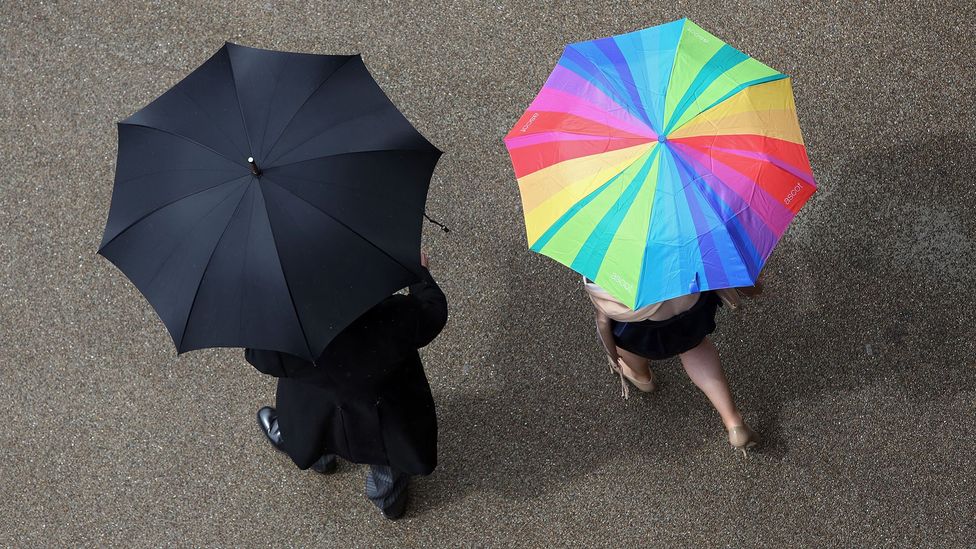
More than nine in ten Brits have talked about the weather condition in the last 6 hours. But is this unusual – and if so, is it their culture or the climate that makes them and then obsessed?
O
Oscar Wilde said conversation near it was the last refuge of the unimaginative, while Bill Bryson noted that its near striking characteristic is that there isn't much of information technology. The weather – and the British obsession with talking about information technology – has been puzzling outsiders for decades.
According to contempo research, 94% of British respondents admit to having conversed about the weather in the past six hours, while 38% say they have in the past 60 minutes. "This means at almost any moment in this land, at least a 3rd of the population is either talking about the weather condition, has already done so or is most to practise and so," says social anthropologist Kate Fox, who performed the studies in 2010 for an update of her volume Watching the English.
And so why do the British do information technology? Is there something about the nation's weather that makes it worthy of discussion, or is it just a cultural foible? And do any other nationalities share this peculiar conversational trait?
Stormy skies
Several features of Great britain's geography make the conditions the way it is: mild, changeable, and famously unpredictable.
Britain's position at the edge of the Atlantic places information technology at the finish of a tempest track – relatively narrow zones over oceans that storms travel downwardly, driven past the prevailing winds. "These storms are feeding on the temperature difference from the equator to the pole," says Douglas Parker, articulation Met Office professor of meteorology at the University of Leeds.
Every bit the warm and cold air fly towards and over each other, the world's rotation creates cyclones – and the UK bears the tail end of them.
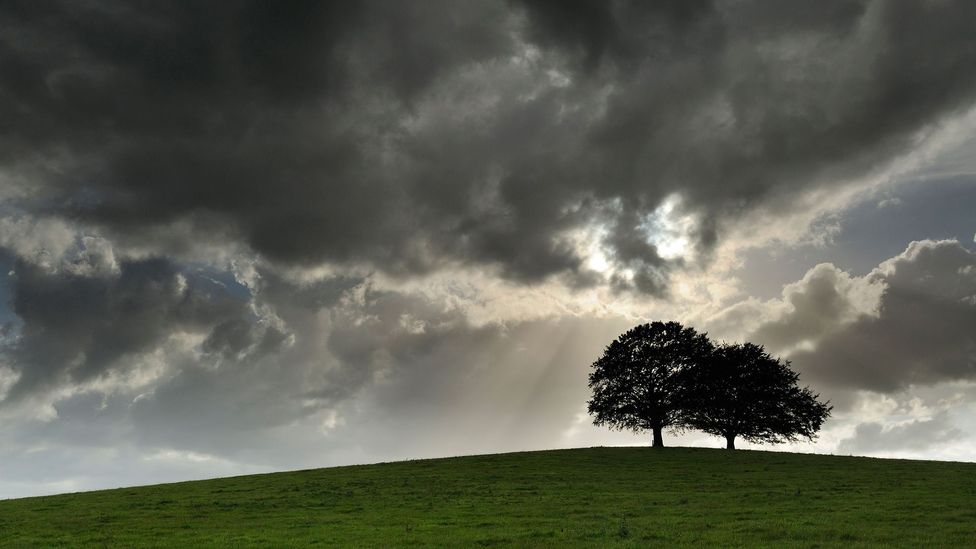
Thank you to the UK's location, it bears the brunt of storms caused past the earth's rotation (Credit: Stephen Spraggon/Alamy)
Then there is the Gulf Stream, which makes the British climate milder than it should be, given its northern latitude, and the fact that the U.k. is made upwardly of islands, meaning there is a lot of moisture in the air. "Water in the atmosphere makes the weather condition especially unpredictable," Parker says.
The variability ways residents never know quite what to look. Snow in summer? T-shirts in winter? Recently, the hottest-ever Nov day was recorded in mid-Wales, with temperatures hitting a balmy 22.4C. "It'southward much more unpredictable than the climate of many countries," says Trevor Harley, chair of cognitive psychology at the University of Dundee, who runs a website devoted to the British weather condition. "There's always something happening – and if there isn't, there is the promise."
It is these types of extremes that generate much of the debate on online forums nearly the British weather (yes, they do exist!). The British Weather Newsgroup, for instance, has been running since the mid-1990s and was started equally a forum for enthusiasts to talk over scientific aspects of the British weather.
Today, almost all aspects of the conditions are up for debate, although there are two major themes, says Harley. One is speculation about – and a desire for – severe weather, such as a traditional white Christmas – never heed the fact the Britain has only experienced a widespread, Dickensian-similar Christmas snow 4 times in the past 51 years.
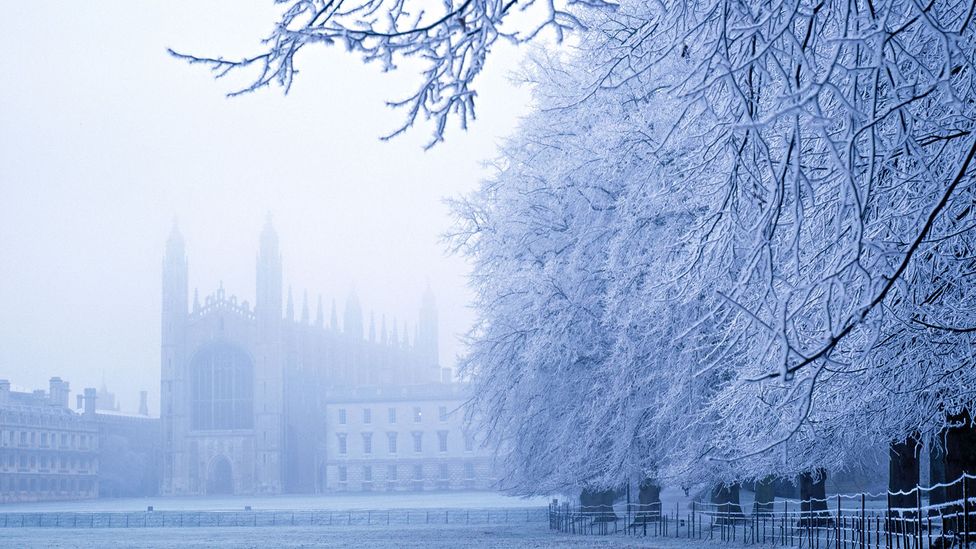
The Uk has just had a Christmas snow four times in the last 51 years, only that hasn't kept people from talking about information technology (Credit: Jon Arnold Images Ltd/Alamy)
The other theme is nostalgia for the weather of the past, which Harley notes is often at odds with the reality. "In my retentiveness, every summer's solar day in the 60s was hot and sunny with unbroken sunshine. In fact, this could only have been a few days in a few months; summers in the 60s were unusually cool and unsettled," he says.
Coded conversations
Many of the twenty-four hours-to-day conversations British people initiate about the weather condition, nevertheless, are more mundane. Comments like "cold, isn't it?" don't fifty-fifty specially demand a full response; a grunt of understanding will suffice.
Fox has eavesdropped on hundreds of such conditions-related conversations as role of her research. She concludes that they're less virtually the weather and more akin to the kind of physical training that occurs among our primate cousins. "Weather talk is a kind of code that we take evolved to help us overcome social inhibitions and actually talk to one another," says Fox.
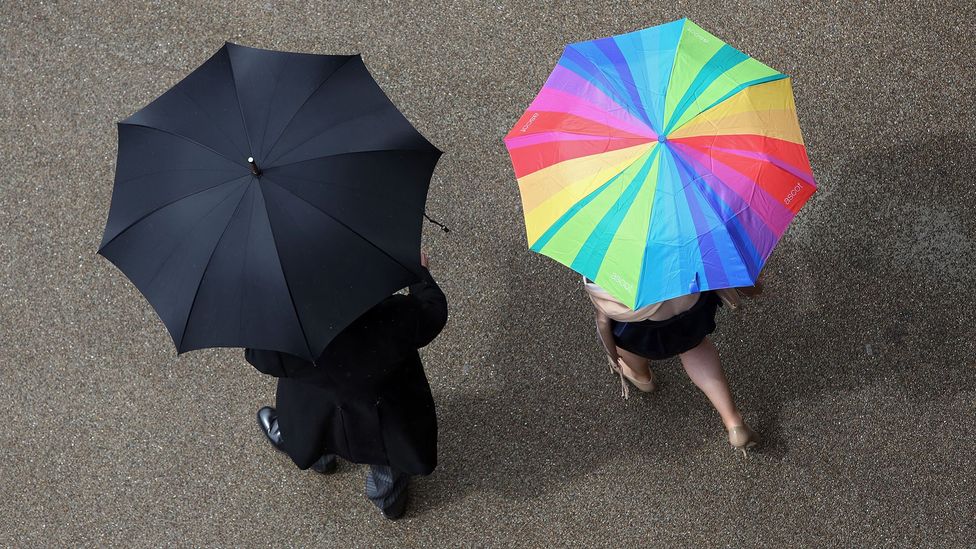
Even if you know information technology's raining out, British etiquette calls for you lot to phrase information technology every bit a question: 'Raining over again?' (Credit: Agencja Fotograficzna Caro/Alamy)
In some situations, atmospheric condition talk is an icebreaker. In others it'south used to make full awkward silences, or divert the conversation away from uncomfortable topics. Oftentimes information technology's an excuse for a good old grumble, which tin can be a bonding experience in itself, only we can besides use weather speak to gauge other people's moods: "Depending on their response to your weather greeting, you lot tin tell if someone is in the mood for a chat, or is feeling grumpy and negative," says Fox.
But there are certain unwritten rules that the British follow when conducting these weather condition-related conversations. Firstly, the topic will nearly always be introduced as a form of question, even if only in the intonation (e.1000., "Raining once again?"). Secondly, the person answering must agree. "Failing to agree is quite a serious breach of etiquette. Or at least if you disagree, you take to express it in terms of a sort of personal foible," says Fox. "If someone says: 'Common cold, isn't it?' and you say: 'Well actually, no,' the person would exist a chip taken aback, and feel that that was a discourteous matter to say."
Positive or negative?
Of course, these kinds of purely social conversations also occur in other cultures. Merely both the nature of the conversation – and their content – will vary. Derek Bousfield, an expert in language and impoliteness at Manchester Metropolitan University, explains that in every culture, individuals tread a delicate balance. On the one hand, they want approval by other members of society and to forge closer bonds with others. On the other, they desire to be democratic and left alone.
Academics phone call these opposing needs a 'positive face' and 'negative face', respectively, and most societies privilege one over the other. "British people stereotypically favour negative face (the desire to be unimpeded) over positive face (the desire to exist approved of), although nosotros still accept a sense of positive face," says Bousfield. "For instance, getting on the charabanc and ignoring someone you know would be an affront to positive face up, and cause interpersonal bug. But negative face" – which in this example, might hateful not intruding on a stranger's personal space, or refraining from starting an unwanted conversation – "has greater weight."
When it comes to small talk, countries that privilege positive face will choose personal topics, such equally someone's age, weight or what they do for a living, every bit an appropriate icebreaker. That explains why people from some cultures – including the Middle East, China, Southeast Asia, South America and the U.s.a. – will ask questions that British people might find rude at worst or a tad forrad at best, says Bousfield.
A country similar United kingdom, on the other hand, will choose a safe and personally unobtrusive topic – such as the weather.
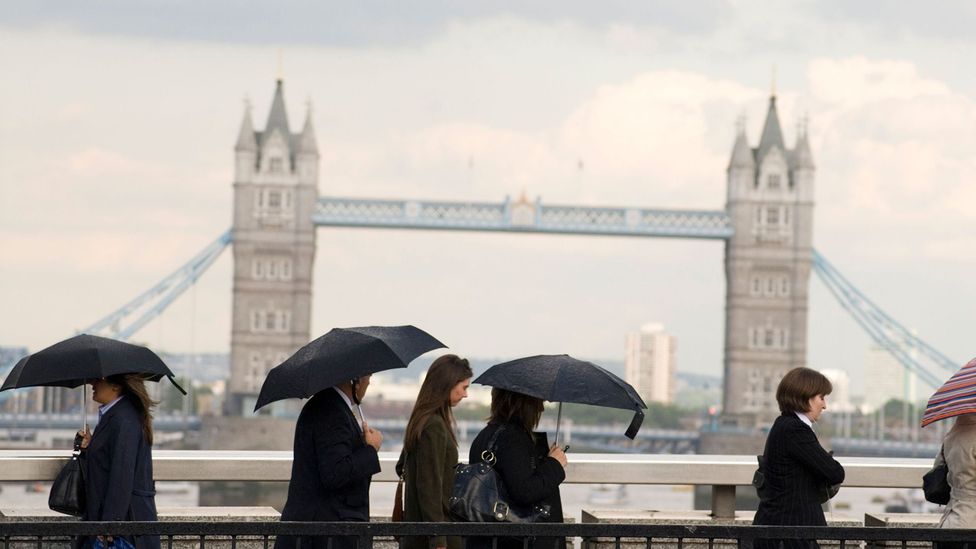
For a land similar Uk, which privileges personal space, the weather condition provides a safe topic of conversation (Credit: Alex Segre/Alamy)
Japan, Switzerland and Finland are other examples of negative confront cultures. And certainly in Japan, another isle nation with unpredictable conditions, the weather and the seasons are common conversation topics. Take the following haiku by the Japanese novelist Natsume Soseki: "Over the wintry forest, winds howl in rage with no leaves to blow."
The Swiss and Finns, though, are not quite as obsessed, maybe because there's less to talk about. In Finland, for example, you can bond with people simply by sitting and drinking with them; you don't even have to talk much, says Bousfield. "When you practise this in the depth of winter – where Helsinki has underground tunnels and so the shops can notwithstanding operate even in deep snow – what weather is at that place to talk almost?" he says. "Everyone knows it's only going to be water ice and snow for upward to 4, five or sometimes six months, so why talk almost information technology?"
In Britain, on the other hand, we tin be wrapped up confronting the elements on Saturday; picnicking in shorts and t-shirt on Sunday; and battling torrential rain on Monday. That's merely the way it is hither.
Cold, isn't it?
Follow BBC Futurity on Facebook , Twitter , Google+ and LinkedIn . This story is a role of BBC United kingdom – a series focused on exploring this boggling island, one story at a fourth dimension. Readers outside of the UK tin meet every BBC U.k. story by heading to the Britain homepage ; you too can run across our latest stories by following u.s.a. on Facebook and Twitter .
Source: https://www.bbc.com/future/article/20151214-why-do-brits-talk-about-the-weather-so-much
0 Response to "We Began to Talk About the Weather Again and Other Banal and Insoluble Questions"
Post a Comment